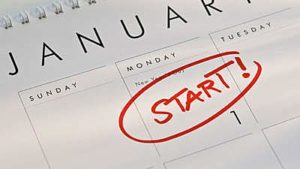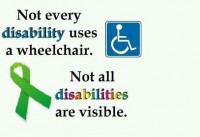 By the time you read this, you may have already blown your New Year’s Eve Resolution(s).
By the time you read this, you may have already blown your New Year’s Eve Resolution(s).
Why do we even bother to make them? Over the years I’ll bet I’m zero for fifty. I’ve discovered several possibilities as to why they don’t work, at least for me.
- January 1st is really an arbitrary boundary.
In the past I’ve told myself “It’s a new year. It can be a new me.” If I really wanted to make the New Year’s Resolution (NYR) change, why did it have to wait ’til the ball dropped? The change most of us are pursuing is “chosen” (as opposed to “imposed” upon me by something or someone external). It’s something I’ve usually convinced myself I need to do in order to live a better life (e.g., spend less, eat less, exercise more, be better organized).
The NYR method bears a rather hard-edged assumption that the behavioral changes I tell myself to make, as of January 1st, will fix something. Yet I’ve never fixed anything this way. I’ve never lost the weight I expected to lose, nor organized my office into the lean, mean, brilliance generator I thought it should be. So when the idea of my making some sort of change arises, I dismiss the whole “January 1st” start date and instead say, “If not now, then when?”
- Whose resolution is it anyway?
This gets down to the question of “Is this for me? Or is this to influence how I’m perceived by those who surround me?” Often in my past, I have entered the NYR contract because others have convinced me (or so I thought) to quit smoking or to dress better. (There’s nothing like a recently reformed smoker zealot!)
Admonitions from these types tend to fall on my ears like my parents’ warnings: “If you keep this up, young man…”. And you know how I responded to most of those? Right. I almost can’t wait for this exercise to fail! So now I check whether this is an internal or external driver.
- Where are the orders coming from?
You know the wording of the NYR contract. “Starting January 1st I will no longer blah, blah, blah.” The idea that this is a suggestion left the station sometime in the 48 hours preceding New Year’s Eve. Resolve takes over. “Dammit! This time I will no longer blah, blah, blah!” In essence, I have left my body and become some ultimate authority and ordered myself to modify a behavior. Even if I’ve convinced myself it’s not for someone else’s observation, I believe I need a good swift kick in the ass to pull this off.
I vividly remember my father, even in a nurturing manner, telling me what I had to do to become a better tennis player. And a golf coach who I pay telling me how to fix my mid-range-iron challenges. I tend to rebel against both of those, which is why I don’t play tennis and my handicap is north of 30. I don’t like being told what to do. I want what I do to be my idea. I believe I’m not alone in that. Which brings me to the next point.
- Wanting to change works better for me than having
Simon Sinek prioritizes how organizations make changes. In his world, three components are necessary. 1) What the change is supposed to look like. 2) How the change will be affected. And 3) Why we want to make that change.
His mantra is to “Start with why.” He even wrote a book by that name. In my coaching world, behavioral modifications always seem to work out better when my client is clear about why they want to make the change. When they succeed, what effect will it have on their life, income, or happiness? I have been quite successful at achieving things where that clarity existed. People who know me have reported I could find a way over, around or through any wall that stood in my way of something that I clearly want. In the coaching world, in my personal world, and indeed in your world, the biggest challenge we face is developing that clarity on what it is that we really want.
Changes I’ve made over the past 30 years or so have never revolved around an artificial date. New Year’s Day this year happened to be a Monday. So what? November 8th works too.
When I’ve started to feel like making changes, I’ve spent the time acknowledging that many of them, if not most, revolved around the world’s perception of me. Yup, my ego was involved. And those feelings rarely, if ever, developed enough energy to even launch.
Sometimes I get through these first two filters and find my internal lecturer sounding every bit like my dad or my teacher or some asshole boss telling me “I gotta start running three miles a day” or “stop eating French fries,” or some such dribble. I don’t respond too well to being ordered around—even by me!
It doesn’t even start to get traction until I know it’s not date-sensitive, I’m doing it for me (not my public relations), I’ve negotiated this endeavor—not succumbed to a directive (even my own)—and I’ve spent reasonable effort visualizing how my life, my relationships, my longevity, or my environment will benefit. Now I have Sinek’s “why?”.
Then and only then have I been able to avoid ordering myself to abandon some sixty-year habit and realize that I wanted the outcome so badly that the exercise of working on changing had sufficient value. Then over, around, or through any wall that stands in my way is what I want.
Want trumps need in my world. Need feels like an authority figure pointing a finger at me and ordering me, even if I’m that authority figure! Want summons up the visuals of a better world that I can see a path to. And if part of that path is a change in my behavior, then… well… Happy New Year



